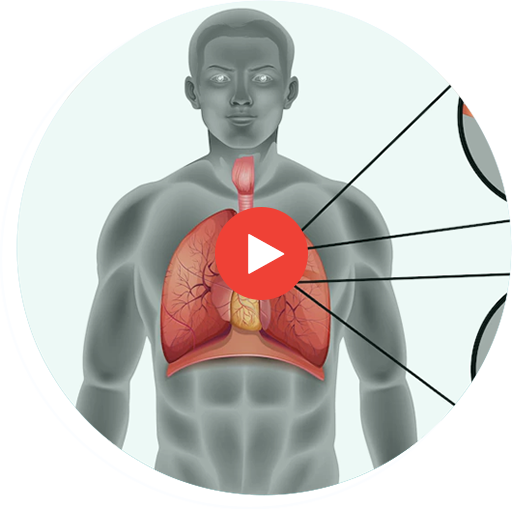
Consult an Online Doctor
For Asthma
Book an Appointment for
Only 
Asthma is a chronic medical condition that affects breathing and causes respiratory issues. It
needs constant management and medical care for life.
Over 24 million people have Asthma in the United States, including nearly 5.5 million infants
and children. Asthma can be fatal if not diagnosed and treated in time. The treatments enable
you to control your asthma and enjoy a normal lifestyle.
Types of Asthma
Asthma is identified as either intermittent or persistent. The persistent type can range from mild to severe, depending on the person. The severity of asthma is based on how often and severe the attacks are. Asthma attacks are further categorized as allergic and non-allergic. Allergic attacks can be caused by a person's current allergies or allergens like pollen, molds, dust, etc. In comparison, non-allergic attacks are brought on by external factors such as stress, exercise, illness, and disagreeable weather.
Book an Appointment for OnlyTELMDCARE
Is covered by many popular
insurance plans

Who is at risk?
Anyone, regardless of age, can suffer from asthma. But smokers or people who are exposed to secondhand smoke regularly, are at a higher risk of suffering from asthma. In case a child or infant develops asthma, it's medically classified as childhood asthma. Whereas if asthma develops in later stages of life, it's classified as adult-onset asthma. Children and infants don't usually grow out of the condition. The symptoms may reduce in frequency and severity as they grow older. But they are still at risk of suffering an asthma attack later in life. If your child suffers from asthma, you can consult your telemedicine doctor for asthma to understand its risks and how to manage it.
Causes of
Asthma
It is still unknown what exactly causes asthma in some people. But some specific factors may increase the likelihood of developing asthma. These include:
Asthma attacks can occur when exposed to substances irritable to the respiratory system,
including the nose, airways, and lungs.
Substances that cause asthma attacks are medically known as triggers. Preventing asthma attacks
can be easier if patients know what their triggers are.
Some common triggers are:

TELMEDCARE
What we treat
We treat a variety of acute and chronic conditions and provide expert medical advice and guidance for our patients.
Read More
What Happens During
An Asthma Attack?
Typically, muscles surrounding the airways let us inhale and exhale easily. But an asthma attack
can cause 3 things to happen.
Bronchospasm: Airway muscles tighten, narrowing the passage which prevents
breathing normally.
Inflammation: The linings of the airway swell up and restricts air from flowing
freely to and from the lungs.
Mucus production: The body produces more mucus than usual, clogging the
airways.
How to Avoid Asthma Attacks?
To avoid asthma attacks, you should know what your triggers are. With this knowledge, you can prevent attacks by avoiding your triggers and ultimately, an asthma attack. By doing so, you can lessen the frequency of these attacks.
TELMDCARE
Management and Treatment
There are a few options to manage asthma. A doctor consultation with can help you control the symptoms with prescribed medication. These medications may include:
There are many different ways to take asthma medication. You can use a Nebulizer, a metered-dose inhaler to breathe in the medication, or another type of inhaler. You can also take oral medications that your doctor may prescribe. If the symptoms don't subside even after taking the medication then make an online appointment for a virtual doctor for an asthma consultation.

TELMDCARE
As Seen On

TELMDCARE
Sign Up
Our best online doctors on call ensure that the services we provide are adequate, high quality,
and affordable.
Get in touch with us today for more details or Sign Up for a quick consultation.
$43 SIGN UP
TELMDCARE
FAQS About Asthma
When inflammation leads to a red, swollen, narrow, and extra-sensitive area in the airways, it's referred to as asthma. It triggers recurrent attacks of coughing, chest tightness, breathlessness, and wheezing. Fortunately, treatment can help these symptoms and prevent further attacks. If you have a serious attack, you should seek immediate medical help. Asthma is a long-term chronic disease. Although it doesn't stay the same, its symptoms and attacks can change over time. Asthma is a common condition that affects around one in ten people in the Western world.
Inflammation of the airways can lead to asthma symptoms such as coughing, chest tightness, and breathlessness. It can also restrict or limit the airflow into and out of the lungs. The inflammation of the airways can lead to various conditions, such as swelling of the walls of the airways and the development of too much mucus. These conditions can then block or plug the airways, narrowing them and restricting their ability to function properly. The airways become more sensitive as the inflammation continues. This means that they'll react faster to certain triggers, such as dust, smoke, allergens, and stress.
The inflammation is caused by a reaction to infections and other triggers that affect the lining of the airways. It can make the airways red, swollen, and extra sensitive.
The presence of asthma in a family can lead to an increased likelihood of developing it. Kids with food allergies or eczema are more prone to developing asthma than other children. People with asthma are also more prone to developing it if they have house dust mites, pets, or pollen allergies. In addition, being exposed to air pollution and tobacco smoke can trigger asthma symptoms.
Although asthma can start at any age, about half of those with it have experienced their first symptoms by the time they reach the age of 10. Many kids with asthma also have their first attacks before they turn six.
Although it's widely believed that asthma is caused by a combination of environmental and hereditary factors, it's unclear how these factors work together. Although house dust mites and pet allergens are the most common causes of asthma, other conditions such as mold and pollen can also trigger the condition.
The chronic condition known as asthma is a type of disease that affects the airways. It can cause inflammation and a narrowing of the airways, even when you're not experiencing any symptoms. If your asthma is not under control, it can cause repeated attacks. Treating it can help minimize the risk of these attacks and help the affected person get back to normal. If you experience a serious attack, you should seek immediate medical help. Although asthma can change over time, it can still be treated properly. It can help people with this condition enjoy long periods of good and bad days without experiencing any attacks.
Poorly-treated asthma can worsen with age, and those who cannot control their condition will likely experience worse lung function as they age. Although modern asthma treatments can help people with this condition maintain their lung function, they cannot always predict how long it will take for these individuals' lungs to deteriorate. Most asthma specialists believe regular asthma treatment can help prevent asthma from worsening.
If asthma starts to worsen at an older age, it can become more severe. Also, people with certain medical conditions may have a harder time controlling their condition when they have an asthma attack. Asthma can also be referred to as a chronic obstructive pulmonary disease in older individuals. This condition, a type of disease usually caused by smoking, affects people with different symptoms, such as coughing and breathlessness. Compared to asthma, COPD is generally considered to be a more serious illness that can cause long-term disability. This condition can also affect crucial organs, such as the heart.



